
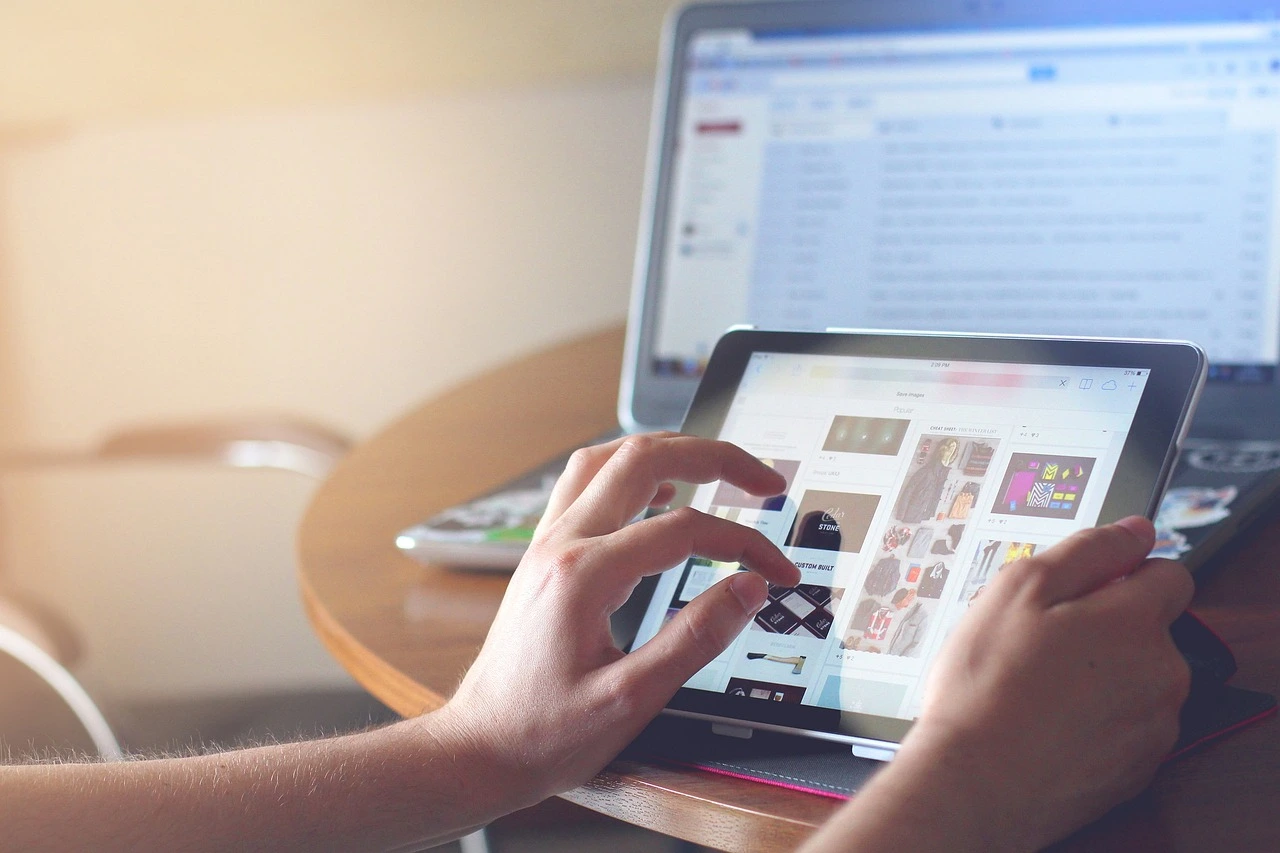 Update: This article was last updated on 3rd October 2024 to reflect the accuracy and up-to-date information on the page.
Update: This article was last updated on 3rd October 2024 to reflect the accuracy and up-to-date information on the page.
Technology is everywhere nowadays! You can use it to watch your favorite shows, learn something new, or play the hottest video games. Luckily for us, there are plenty of devices we can choose from like tablets and smartphones that fit right in our pockets as well as laptops and desktops with more power than ever before – each offering its own awesome advantages!
Let’s consider some factors when comparing a tablet vs a laptop, and deciding which tablet is best for study. Factors like cost, portability, and storage capacity all play a key role in helping parents choose the right device for their child.
Choosing the right device for kids can be a tricky task – it’s an important decision that will impact their studies and happiness! When deciding which tab is best for study, there is so much to consider. We’ve got you covered with information about cost, portability, storage capacity, and more – helping parents make confident decisions about which one fits best for their child.
When comparing the difference between a laptop and a tablet, it’s essential to understand key factors like performance, portability, and cost. These details will guide you in choosing the best device for study purposes.
What is a Tablet?
A tablet is a mobile computing device with a touchscreen display, which is typically smaller and more portable than a laptop. tablets are often used for accessing the internet, reading and responding to email and other messages, playing games, and other tasks that can be performed on a smartphone, but with the larger screen size and more comfortable user experience of a full-sized computer.
Some tablets come with a physical keyboard that can be attached, while others use on-screen virtual keyboards.
Recommended reading: Different types of game development: Which one is right for you?
The iPad ran iOS until iOS 13, after which the tablet version of Apple’s mobile operating system shifted to iPadOS. The iOS environment now applies only to the iPhone.
What is a Laptop?
A laptop is a type of portable personal computer that typically comes with a keyboard, a touchpad, and a clamshell form factor. Unlike a desktop computer, which is designed to be used in one fixed location, a laptop is designed to be easily transported and used in a variety of different locations.
Laptops are typically equipped with a range of features and capabilities that make them suitable for a variety of tasks, including accessing the internet, creating and editing documents, and running a wide range of software applications. Most laptops are powered by a rechargeable battery, which allows them to be used for extended periods of time without needing to be plugged into a power outlet.
Let’s consider the difference between laptops and tablets while understanding the advantages and disadvantages of these devices, to make an informed decision for study or work purposes.
Things To Consider Before Buying a Tablet or Laptop for Kids
When buying a tablet or laptop for a child, there are a few key factors to consider to determine which tab is best for study.
1) It’s important to consider the computer’s operating system and the availability of educational and age-appropriate apps and games. For younger children, a tablet or laptop with a child-friendly operating system, such as Amazon’s Fire OS or Google’s Chrome OS, maybe the best option.
2)You should consider the child’s age and level of maturity, as well as their specific needs and interests. For younger children, a simple, easy-to-use tablet may be the best option, while older children may be ready for a more advanced laptop.
Recommended Reading: Chromebook vs Laptop for Kids
3) Additionally, you should consider the computer’s durability and battery life, as well as any parental controls or other security features that may be important for your child’s safety. Finally, it’s a good idea to research the different models and brands available to find the best fit for your child’s needs and your budget.
Advantages of a Tablet
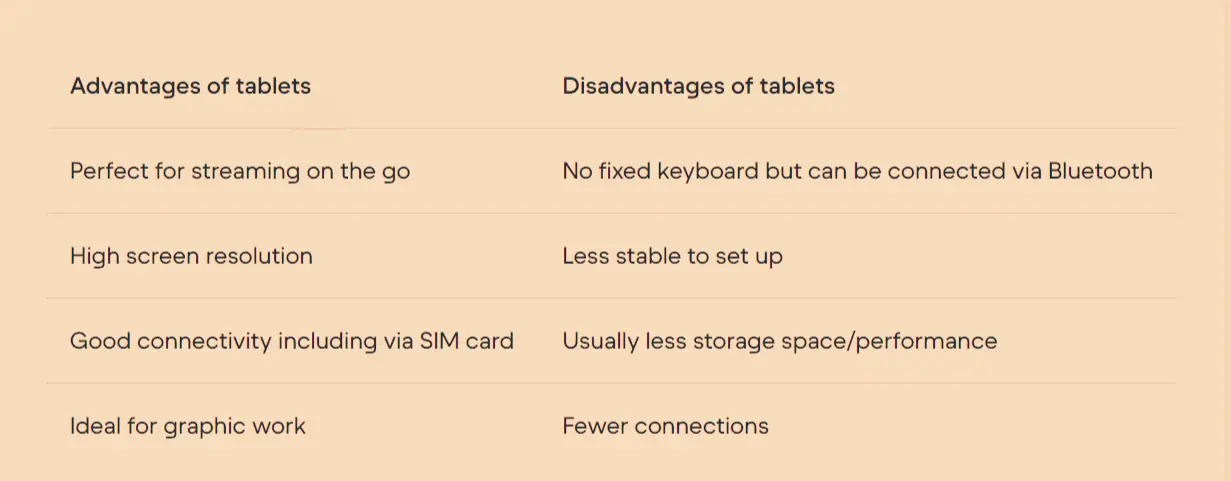
There are several advantages to using a tablet over a laptop.
1) Tablets are generally smaller and more portable than laptops, making them convenient to carry and use on the go.
2)Many tablets come with a range of built-in features and apps that can be used for a variety of purposes, including productivity, entertainment, and education.
3) Tablets are often less expensive than laptops, making them a more affordable option for many people.
4)Tablets are typically designed with a simple, user-friendly interface that makes them easy to use, even for those who are not particularly tech-savvy. Additionally, tablets often offer long battery life, allowing you to use them for extended periods of time without needing to recharge.
5)Another advantage of tablets is their touchscreen display, which allows for a more intuitive and interactive user experience than a laptop. This makes tablets particularly well-suited for tasks such as browsing the internet, watching videos, and playing games
Disadvantages of a Tablet
While tablets have many advantages, they also have some limitations compared to laptops.
1)Tablets have limited computing power and storage capacity. While tablets are fine for basic tasks such as browsing the internet, checking email, and using social media, they may not have enough power to handle more demanding tasks, such as video editing or gaming.
2)Additionally, tablets are often more expensive than laptops with similar capabilities, making them a less affordable option for many people. Finally, tablets are generally less durable than laptops and are more susceptible to damage from drops, spills, or other accidents. This can make them a less reliable option for people who need a computer that can withstand daily wear and tear.
3)Tablets have smaller screens and virtual keyboards, which can make them less comfortable to use for extended periods of time. This can be especially challenging for people who need to do a lot of typing or other tasks that require a full-sized keyboard.
Advantages of Laptops
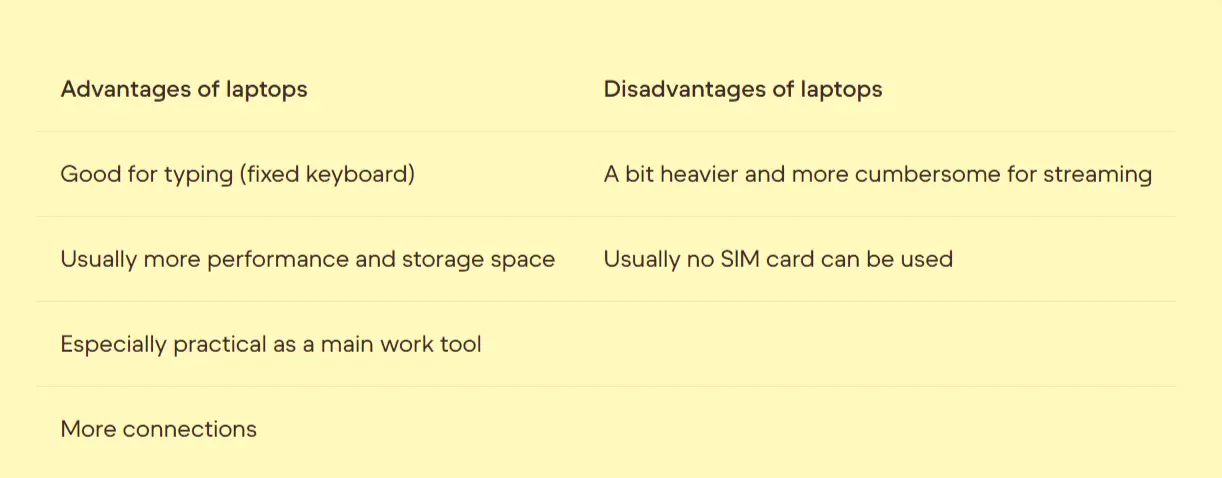
Laptops offer several advantages over tablets
1)Main advantage of a laptop is its portability. Unlike a desktop computer, which is designed to be used in one fixed location, a laptop is designed to be easily transported and used in a variety of different locations. This makes laptops an ideal choice for people who need to be able to access their computer while on the go, such as students, business professionals, and travelers.
2)laptops have larger screens and keyboards, which make them more comfortable to use for extended periods of time. Laptops also typically offer more computing power and storage capacity than tablets, making them better suited for tasks that require a lot of processing power or storage, such as video editing or gaming.
Additionally, many laptops come with a range of features and capabilities that make them versatile and useful for a variety of tasks, including accessing the internet, creating and editing documents, and running a wide range of software applications. Finally, laptops are often more affordable than high-end tablets, making them a cost-effective option for many people.
Disadvantages of Laptops
While tablets vs. laptops involve many considerations, it’s important to note that while laptops offer many advantages over tablets, they also have some limitations.
📍One of the main disadvantages of laptops is their limited battery life. Unlike tablets, which are designed to be used for extended periods of time without needing to be plugged in, most laptops need to be plugged into a power outlet to be used for more than a few hours. This can be inconvenient for people who need to use their computer while on the go, such as travelers or students.
📍Another disadvantage of laptops is their size and weight. While laptops are more portable than desktop computers, they are still larger and heavier than tablets, which can make them less convenient to carry around. This can be a particular issue for people who need to use their computers in a variety of different locations, such as commuters or business travelers.
📍Laptops are generally more expensive than tablets with similar capabilities, making them a less affordable option for many people. Finally, laptops are often less durable than tablets and are more susceptible to damage from drops, spills, or other accidents. This can make them a less reliable option for people who need a computer that can withstand daily wear and tear.
Recommended reading: Guide to Find the Right Balance between Technology and Parenting
The graph below illustrates the Kid’s Tablet Market Size, which was valued at USD 18.8 billion in 2023. This market is expected to grow from USD 22.2 billion in 2024 to USD 83.9 billion by 2032, with a compound annual growth rate (CAGR) of 18.1% during the forecast period (2024–2032). Key drivers of this growth include increasing digital literacy, the educational and entertainment value of tablets, parental control features, durability, and child-friendly design.
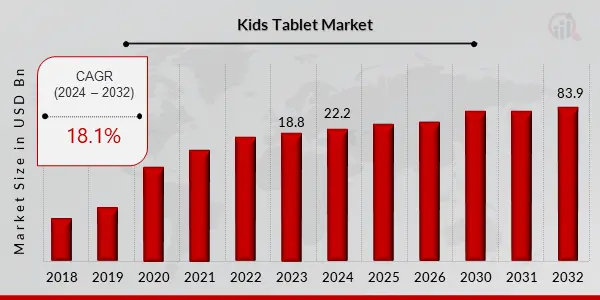
Moonpreneur
Moonprenur is empowering the young generation to become future innovators and entrepreneurs by providing them with the world’s education. Keep learning and follow Moonpreneur to get such informative content for your child.
Moonpreneur is dedicated to transforming conventional education, preparing the next generation with comprehensive learning experiences. Our Innovator Program equips students with vital skills in AI/ML, Robotics, Coding, Game Development, and App Development, fostering entrepreneurship through hands-on learning. This initiative aims to cultivate the workforce of tomorrow by integrating innovative technologies and practical skills in school curriculums.
Register for a 60-minute free workshop today!




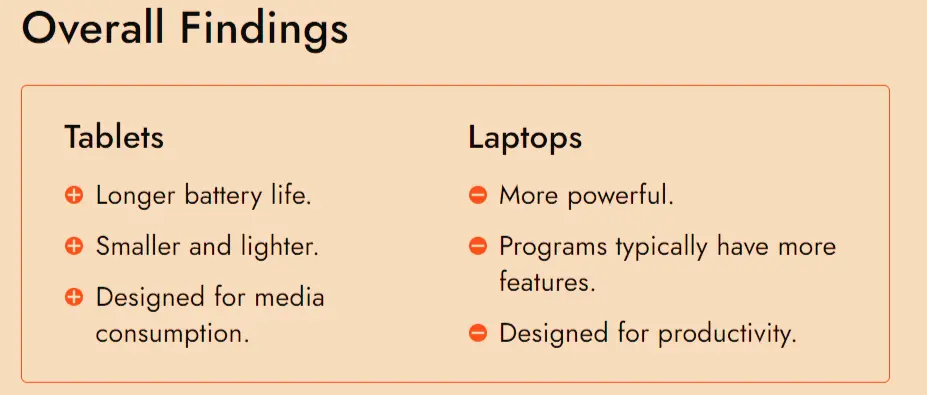






















Which is the best laptop for kids for school related work and online classes?
There is no such thing as the best laptop, every device has its own specs. However to make the best choice, you can read our blog Best Laptop for Online Classes
What is better for students laptop or tablet?
In brief, laptops provide enhanced flexibility for performance and productivity. On the other hand, tablets come with several technical constraints but excel in battery life and portability. It is essential to evaluate your specific needs and make a decision accordingly.